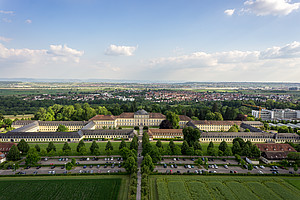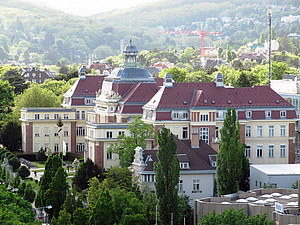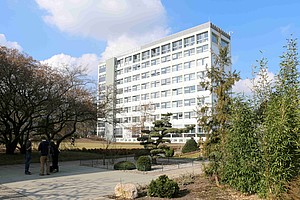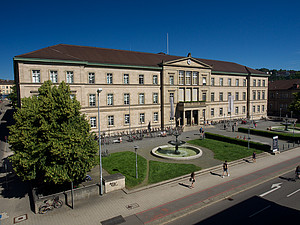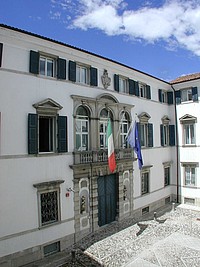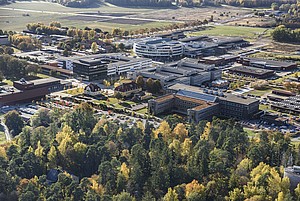Partner Universities in the EU
Coordinator: University of Hohenheim, Stuttgart, Germany
The University of Hohenheim (UHOH) was founded in 1818 and is situated in the south of Stuttgart, the capital of Baden-Württemberg. Hohenheim is the oldest university in town. Surrounded by botanical gardens and experimental fields, the university offers an once-in-a-lifetime study and work atmosphere, has a unique innovative profile and a wide strategic international network. Hohenheim is also one of the few campus universities in Germany, so all important university buildings, i.e. lecture halls, institutes, libraries, computer rooms, cafeteria and the Office of International Affairs are within walking distance. The city centre is approximately 30 minutes away and can easily be reached by various means of public transport. UHOH has three faculties: Agricultural Sciences, Natural Sciences as well as Business, Economics and Social Sciences. Currently UHOH offers a total of 12 Bachelor programs in German, 14 Master programs in German, 18 Master programs in English as well as 3 structured programs on Doctorate level - one for each faculty. Almost 10.000 students can benefit from the study offers, among them ca. 14% are international.
University of Natural Resources and Life Sciences Vienna, Austria
Founded in 1872, the University of Natural Resources and Life Sciences Vienna (BOKU) is not organized by faculties but is structured in 15 Departments. At the moment it offers 8 Bachelor and 27 Master programs (of which 12 are taught in English and 11 are international Master programs in cooperation with partner universities in Europe and worldwide). Additionally, there are 4 PhD programs, 2 of which are organized in an international setting. BOKU holds the record of having the highest number of English-taught Master programs in Austria. The University is home to 12.950 students of which apr. 20% are international. BOKU's scientists are working in diverse research projects spread across different countries and managed in international research teams. Furthermore, BOKU is a member of several interstate networks and has more than 160 partner universities in Europe and worldwide. 1/3 of BOKU's professors are no Austrians. 1570 graduates per year can profit from this complex educational system which results in BOKU being a top ranked Austrian HEI in regard to students' satisfaction.
Czech University of Life Sciences Prague, Czech Republic
The Czech University of Life Sciences Prague (CULS) was founded in 1906 and is recognized as one of the traditional European centers of excellence. CULS guarantees high quality university education in classical agricultural and forestry subjects, in environmental management, as well as in informatics, finances, and in private and corporate business administration. CULS has grown substantially over the years; the number of enrolled students has more than tripled in less than 15 years and reached 18.149 in 2016/2017. Moreover, 3.100 international students can benefit from 82 BSc study programs (8 of which are taught in English), 107 Master programs (20 in English) and 98 PhD programs (23 in English) offered on 7 different faculties and institutes. CULS is one of the top Czech universities in the field of international cooperation and has implemented the international ECTS system of study recognition already in year 2000. The HEI has signed more than 200 Memoranda of Understanding with universities in 89 countries in the world.
University of Tübingen, Germany
The University of Tübingen (UT) is the oldest research university in the IAMONET-RU network, situated in Tübingen, Baden-Württemberg, Germany. The University's history began in 1477, when Count Eberhard of Württemberg founded it. Today Tübingen remains a hub of research and teaching. UT is home for 28.000 students, doing studies at the University’s 7 faculties (Protestant Theology, Catholic Theology, Law, Medicine and University hospitals, Humanities, Economics and Social Sciences, Mathematics and Natural Sciences), including almost 11% coming from abroad. University of Tübingen contains 14 schools, which offer 280 courses at all levels of study from BSc to Doctorate. UT is one of the classical university towns of Germany - its area comprises departments, libraries, archives, refectories, university’s teaching hospitals and halls of residence smartly situated within the town. As one of the German universities in the top “Excellent” class, UT has 8 collaborative research centers and hosts 6 research training groups.
University of Udine, Italy
The University of Udine (UNIUD) was founded in 1978 as part of the reconstruction plan after the earthquake in 1976. Its aim was to provide the community with an independent center for advanced training in cultural and scientific studies. The University currently has the following areas and degree programs to focus on: Scientific area (Agricultural Sciences, Engineering, Mathematics, Computer Sciences/Multimedia and Biotechnology), Humanistic area (Arts/Cultural Heritage, Modern languages, Communication/Teacher Education), Economic and Law area (Economics, Law) and Medical area. Right now the following degrees can be obtained at UNIUD (depending on speciality): 36 First Cycle Degrees, 32 Second Cycle Degrees, 4 Laurea Magistralis, 31 Specializations, 15 Master degrees, 15 Doctorate degrees. 4 Master programs are held interily in English, 11 BSc/MSc programs are partially held in English. The University participates in many research projects at national and international levels. Since its establishment, it has pursued the policy of internationalization, aimed at preparing students and forging relations and partnerships with universities and institutions in Europe and the rest of the world. Udine University collaborates not only within Europe but across the globe and has long-standing international connections. The present number of students enrolled at the HEI is approx. 17.000 and ca. 1.000 of them are of non-Italian origin.
Swedish University of Agricultural Sciences, Sweden
The Swedish University of Agricultural Sciences (SLU) - is a young university with a long history. It was founded in 1977 out of the agricultural, forestry and veterinary university colleges and schools. SLU has 36 departments and units that are organized in 4 faculties. SLU offers 23 programs starting at the Bachelor level. Some of them are 3 years BSc programs, but most of them are professional programs that continue on the Master level. SLU also offers 17 Master programs and all of them are taught in English. There are no specific PhD programs, although SLU provides many PhD courses. Right now 3800 full time students study in SLU, ca. 360 of which are exchange/foreign. SLU's knowledge is central to several of the major global challenges: food supply, productivity development in agriculture and forestry, water shortage and water quality, pandemics and zoonosis, climate change, impoverishment of genetic and aquatic resources, non-renewable raw materials, urbanization and lifestyle changes. Roughly 70% of SLU's activities comprised of research, making it one of Sweden's most research-intensive universities.
Wageningen University, the Netherlands
The history of the Wageningen University (WUR) began with National Agricultural College established in 1876. A modern global supplier of application-oriented and field-based research, WUR successfully combines research, education and value creation in three core fields: health, lifestyle and living conditions, nutrition and food production, living environment. Research and experimental facilities of WUR are placed in 28 different parts of the Netherlands. With 20 bachelor programs, 31 master's programs and 6 graduate schools, WUR is the world's leading institutions of scientific education in the priority domains. The HEI's teaching has a strong international focus: of the total number of 10 000 students, 21% are of non-Dutch origin. In addition to BSc and MSc programs, WUR offers short courses, on-the-job training and management training to professionals in the food, agricultural and pharmaceutical industries. According to the Times Higher Education World University Rankings it is the best university in the Netherlands and No. 1 worldwide, in agriculture and forestry for 2016 on the QS World University Rankings charts.
Warsaw University of Life Sciences, Poland
The Warsaw University of Life Sciences - SGGW was established in 1816 under the name Institute of Agronomy in Marymont and celebrated its 200th Anniversary in May 2016. WULS is the fourth oldest agricultural university in Europe known from 1918 under present name: Szkoła Główna Gospodarstwa Wiejskiego (SGGW). Currently WULS has 13 faculties and offers 38 programs on Bachelor level, 30 programs on Master level and 15 PhD programs that guarantee quality education not only for the locals but also for students from abroad. The study offer covers a wide range of topics - from biological and technical ones, through medicine, economics and humanities. At the moment there are 25.000 students at WULS. The number of international students who were enrolled at the HEI in 2015 amounted to 809. The university's staff is also involved in a considerable number of international didactic, research and exchange programs. It has research and educational cooperation with over 300 foreign universities from 50 countries in the world. WULS is considered one of the most innovative and creative universities in Poland at creating job perspectives and providing supreme learning conditions, modern facilities for sport and recreation.

